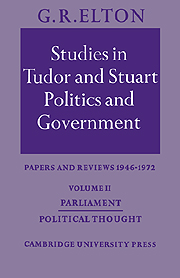Book contents
- Frontmatter
- Contents
- Acknowledgments
- Abbreviations
- III PARLIAMENT
- 21 Studying the History of Parliament
- 22 ‘The Body of the Whole Realm’: Parliament and Representation in Medieval and Tudor England
- 23 Parliamentary Drafts 1529–1540
- 24 The Evolution of a Reformation Statute
- 25 The Commons' Supplication of 1532: Parliamentary Manoeuvres in the Reign of Henry VIII
- 26 An Early Tudor Poor Law
- 27 The Stuart Century
- 28 A High Road to Civil War?
- 29 The Unexplained Revolution
- IV POLITICAL THOUGHT
- General Index
- Index of Authors Cited
25 - The Commons' Supplication of 1532: Parliamentary Manoeuvres in the Reign of Henry VIII
Published online by Cambridge University Press: 23 December 2009
- Frontmatter
- Contents
- Acknowledgments
- Abbreviations
- III PARLIAMENT
- 21 Studying the History of Parliament
- 22 ‘The Body of the Whole Realm’: Parliament and Representation in Medieval and Tudor England
- 23 Parliamentary Drafts 1529–1540
- 24 The Evolution of a Reformation Statute
- 25 The Commons' Supplication of 1532: Parliamentary Manoeuvres in the Reign of Henry VIII
- 26 An Early Tudor Poor Law
- 27 The Stuart Century
- 28 A High Road to Civil War?
- 29 The Unexplained Revolution
- IV POLITICAL THOUGHT
- General Index
- Index of Authors Cited
Summary
In the third session of the Reformation Parliament, which began on 15 January 1532, the Commons presented a petition against the misdemeanours of the ordinaries, the judges in ecclesiastical courts, and in particular against the way in which heresy trials were conducted; from this ‘Supplication against the Ordinaries’ and the answers produced by Convocation arose the demands of May1532 which compelled Convocation to abdicate the independent jurisdiction and law-making power of the Church. Thus the Supplication, an interesting document in itself, also marks the beginning of the real attack on the liberties of the Church, an attack which had been heralded by the praemunire fine of 1531 but had not before resulted in practical measures. The events of this third session – the passage of the first Act of Annates and the enforced submission of the clergy – ended the period of temporizing and hesitation, and ushered in the full revolution which dominated the history of the 1530s. While the policy pursued up to the beginning of 1532 shows great reluctance in high places to destroy all hope of a settlement with Rome and of obtaining the divorce with the pope's sanction, the session of that year introduced a new and active policy, one of whose first achievements was to reduce the clergy to impotent obedience.
The Supplication, which had such momentous consequences, has not had the study it deserves.
Information
- Type
- Chapter
- Information
- Studies in Tudor and Stuart Politics and GovernmentPapers and Reviews 1946–1972, pp. 107 - 136Publisher: Cambridge University PressPrint publication year: 1974
Accessibility standard: Unknown
Why this information is here
This section outlines the accessibility features of this content - including support for screen readers, full keyboard navigation and high-contrast display options. This may not be relevant for you.Accessibility Information
- 1
- Cited by
